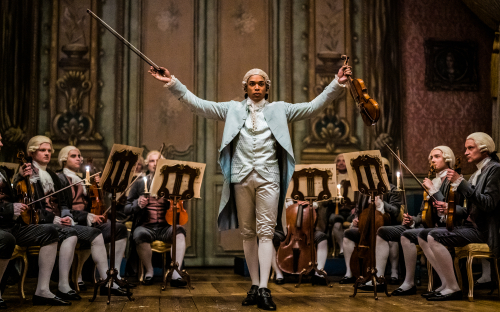
Larry Horricks/20th Century Studios
MOVIE REVIEW
Chevalier (2022)
The opening scene is almost too good to be true. Mozart himself is giving a concert in Paris when an audience member stands up and insults him. Of course Mozart laughs – he’s Mozart! – but the smile vanishes when the insulter challenges him to a violin-playing duel. Of course Mozart accepts – he’s Mozart! – but soon realizes that the challenger is actually pretty damn good, and the audience is so delighted by his chutzpah and his skill that they cheer him to victory. Who the hell is this? Well, his name is Joseph Bologne (Kelvin Harrison Jr.) and before this triumph he stood out in 18th-century French high society anyway. He’s Black.
Director Stephen Williams last made a movie in 1995 (“Soul Survivor,” which also had its world premiere at the Toronto International Film Festival), though he has worked steadily in television, and no doubt has painful personal experience of being a black man struggling to thrive in a world designed by and for white people. A true story such as Joseph’s is the perfect metaphor for what the world does to people who don’t fit in. It’s also a deadly demonstration of how cultural power has always operated – as they say in Ireland, there’s no anti-Semitism there, because the Jews were never allowed in. Joseph’s tragedy is that he doesn’t see the the cultural weight of the racism everywhere around him for what it is. To him, it’s a social faux pas, or a foolish mistake, every time. So when a singer like La Guimard (Minnie Driver) makes a racist proposition he casually rejects, he doesn’t understand her anger goes beyond what it would have been if a white man turned her down.
This is a flaw in his character “Chevalier” goes to some trouble to explore. His father Georges (Jim High) owned a plantation in Guadeloupe and his mother Nanon (Ronke Adekoluejo) was one of his enslaved workers. Georges acknowledged his paternity, but when Joseph was seven dumped him in a French boarding school and left him to find his own way. Little Joseph coped with the relentless, inescapable racism by reasoning that if he was the best at everything, of course he’d be accepted. So he learned to fence, became world-class, and beat a famous white supremacist in a highly publicized match. He made one ride-or-die friend, Philippe (Alex Fitzalan). He picked up a violin, and so enchanted the royal court with his playing Marie Antoinette (Lucy Boynton) herself made him a Chevalier, that is to say a knight. With this protection, its annual salary from the state, and the Queen’s friendship, Joseph throws himself into the world of music, and for a bet agrees to compose an opera, the prize of which is the plum role of the director of the Paris Opera. To achieve this he goes into business with a woman producer, Madame de Genlis (Sian Clifford, a.k.a. Claire from “Fleabag”), because no other man values her abilities. But an opera also needs performers, so Joseph recruits a marquise named Marie-Josephine (Samara Weaving, whose singing voice was dubbed by Grace Davidson), who decides to star against the wishes of her odious husband Montalembert (Marton Csokas, who really is world-class at playing bastards, isn’t he). But then two things happen. Firstly, Georges dies, which manumits Nanon, who comes to Paris to live with her son. And secondly, this is France. Of course Joseph and Marie-Josephine fall in love. And of course the nation’s racism hasn’t gone away despite Joseph’s fancy titles and royal protection. No matter what he does.
Mr. Harrison has been working his way up to leading man for the past decade and here does an absolutely wonderful job as a genius unfairly trapped by other people’s cruel prejudices and whose stubborn refusal to admit it causes many dangerous problems. Ms. Boynton does a fine job under her wigs, but Ms. Driver’s tiny part makes the stronger impression. The main disappointment is Ms. Weaving, who makes it so we can’t tell whether Marie-Josephine is repressing her feelings, or if she had any in the first place. By contrast Ms. Adekoluejo shows through body language and steely patience how much Nanon knows, and how worried she is that Joseph doesn’t seem to. Stefani Robinson’s script doesn’t get too talky with their arguments; the scene where Nanon brings Joseph to a Parisian street party made up of entirely black faces makes its own point.
For a movie so focused on music, this could almost have been a silent film. The pointed visuals of a black man walking through the sumptuous rooms of Versailles surrounded by entirely unwelcoming white faces is strong enough not to need a soundtrack. On the other hand, Kris Bowers’s score – which makes generous use of some of the real compositions by the real Chevalier – has the heaving emotion most classical music knew better than to repress. Together these halves combine into a beautiful, painful movie that just needed slightly better acting to match the high drama of its story. Despite its flaws “Chevalier” is well worth seeing, since as with real life, it does surprise you with its ending. Though of course it shouldn’t – something with chutzpah and skill is always going to be beautifully unpredictable.
Comments